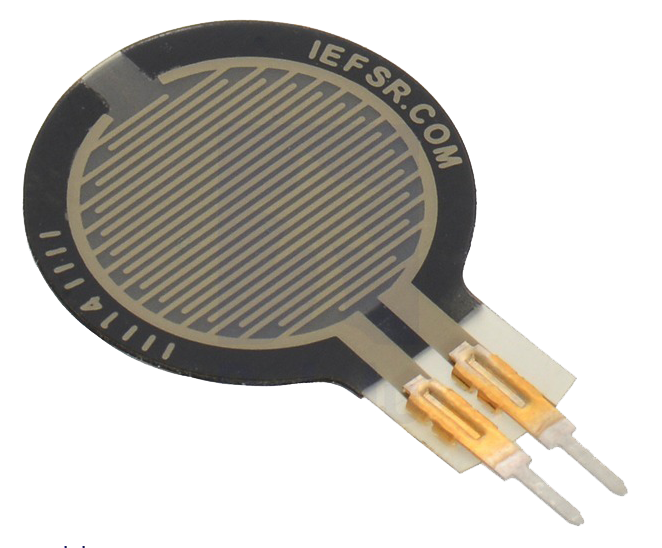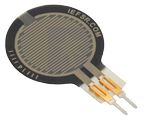Pololu Force-Sensing Resistor: 0.6″-Diameter Circle, Short Tail

Description Attachments
This force-sensing resistor (FSR) from Interlink Electronics is a passive component that exhibits a decrease in resistance when there is an increase in the force applied to the 0.58″-diameter (1.5 cm) active area, allowing you to create a sensor that is able to detect force or pressure. With a force sensitivity range of a few grams to a few kilograms, this sensor is optimized for use in human touch control applications.
In our tests, the resistance exceeded 1 MΩ with no applied pressure and ranged from around 100 kΩ to a few hundred Ohms as finger pressure varied from light (a few dozen grams) to heavy (pressing as hard as possible). The resistance is very stable when the pressure is fixed, and the readings are very repeatable (there are no problems with hysteresis). This resistance range is well suited to work directly with the internal pull-ups of many microcontrollers such as AVRs and PICs. The FSR was responsive enough and sensitive enough to distinctly pick up light, rapid finger taps, and it was even able to pick up the vibrations of a small vibration motor placed on it on the motor’s side.
The 0.72″-diameter circular pad is flexible, light (0.25 g), and extremely thin (0.02″), and it has a circular active sensing area with a diameter of 0.58″. It does not appreciably compress when pressure is applied, and it has a masked adhesive backing for easy mounting. The FSR has two male pins (called “solder tabs”) spaced 0.1″ apart, which means they are compatible with most solderless breadboards and perfboards, though the solder tabs are too short to work well with many 0.1″ connectors. (A very similar FSR with a much longer tail is also available; see the picture on the right for a side-by-side comparison of the two versions.)
In our tests, the resistance exceeded 1 MΩ with no applied pressure and ranged from around 100 kΩ to a few hundred Ohms as finger pressure varied from light (a few dozen grams) to heavy (pressing as hard as possible). The resistance is very stable when the pressure is fixed, and the readings are very repeatable (there are no problems with hysteresis). This resistance range is well suited to work directly with the internal pull-ups of many microcontrollers such as AVRs and PICs. The FSR was responsive enough and sensitive enough to distinctly pick up light, rapid finger taps, and it was even able to pick up the vibrations of a small vibration motor placed on it on the motor’s side.
The 0.72″-diameter circular pad is flexible, light (0.25 g), and extremely thin (0.02″), and it has a circular active sensing area with a diameter of 0.58″. It does not appreciably compress when pressure is applied, and it has a masked adhesive backing for easy mounting. The FSR has two male pins (called “solder tabs”) spaced 0.1″ apart, which means they are compatible with most solderless breadboards and perfboards, though the solder tabs are too short to work well with many 0.1″ connectors. (A very similar FSR with a much longer tail is also available; see the picture on the right for a side-by-side comparison of the two versions.)
Properties
€ 14,85€ 12,30 Excl. VAT (NL)
Delivered in 5 to 14 days
Alternatives in stock
Alternative products
- In stock Adafruit Pressure-Sensitive Conductive Sheet (Velostat/Linqstat) € 6,25 View product
- Pololu Force-Sensing Linear Potentiometer: 4.0″×0.4″ Strip, Customizable Length € 37,40 View product
- Pololu Force-Sensing Resistor: 0.2″-Diameter Circle, Long Tail € 14,85 View product
- Sparkfun SoftPot Membrane Potentiometer - 500mm € 34,- View product
- Adafruit Round Force-Sensitive Resistor (FSR) - 0.3 ~ 10 Newton Force € 5,- View product
- Sparkfun SoftPot Membrane Potentiometer - 200mm € 21,50 View product
- Pololu Force-Sensing Resistor: 1.5″ Square € 22,60 View product
- In stock Sparkfun Force Sensitive Resistor 0.5" € 13,50 View product
- Sparkfun SoftPot Membrane Potentiometer - 50mm € 11,- View product
- Adafruit Linear SoftPot (Ribbon Sensor) € 10,- View product
Customer questions
Q
Customer Reviews
Pololu Force-Sensing Resistor: 0.6″-Diameter Circle, Short Tail ★★★★★Click a star to leave your review
Suggested products
- In stock Opencircuit Male-Female 20 cm band cable 40 pieces € 3,- View product
- In stock Opencircuit HC-SR04 Ultrasonic distance detection module € 2,20 View product
- Opencircuit PIR motion detection module € 2,- View product
- Opencircuit TowerPro SG90 9G micro servo motor - 180° € 2,70 View product
- In stock Opencircuit Arduino Mega 2560 - clone € 26,20 View product
- In stock Opencircuit RC522 RFID Reader / writer module kit 13.56MHz € 3,- View product
- 5 pieces Opencircuit GL5528 LDR - Photosensitive resistor - 5 pcs € 2,10 View product
- Pololu Force-Sensing Resistor: 0.2″-Diameter Circle, Long Tail € 14,85 View product
- Pololu Force-Sensing Resistor: 1.5″ Square € 22,60 View product
- In stock Adafruit Pressure-Sensitive Conductive Sheet (Velostat/Linqstat) € 6,25 View product
- In stock Pololu 3.3V Step-Up Voltage Regulator U1V11F3 € 8,75 View product
- In stock Pololu Step-Up/Step-Down Voltage Regulator S7V7F5 € 9,35 View product
- In stock Pololu 5V, 3.4A Step-Down Voltage Regulator D30V30F5 € 22,- View product
- In stock Pololu Logic Level Shifter, 4-Channel, Bidirectional € 3,85 View product
- In stock Pololu 3.3V, 2.6A Step-Down Voltage Regulator D24V22F3 € 20,90 View product
- In stock Pololu 9V, 600mA Step-Down Voltage Regulator D24V6F9 € 12,10 View product
- 100 pieces In stock Pololu Female Crimp Pins for 0.1" Housings 100-Pack € 13,20 View product
- 100 pieces In stock Pololu Male Crimp Pins for 0.1" Housings 100-Pack € 19,80 View product
- In stock Pololu 9mm Electromagnetic Buzzer: 40Ω, 4-6V, Top Opening € 2,15 View product
- In stock Pololu Stranded Wire: Black, 30 AWG, 100 Feet € 11,- View product
- In stock Pololu 5V, 3.2A Step-Down Voltage Regulator D36V28F5 € 24,20 View product
- In stock Pololu Stranded Wire: White, 20 AWG, 40 Feet € 13,20 View product
- 5 pieces In stock Pololu Mini Pushbutton Switch: PCB-Mount, 2-Pin, SPST, 50mA (5-Pack) € 2,30 View product
- In stock Pololu 5V Step-Up/Step-Down Voltage Regulator S8V9F5 € 11,- View product
- In stock Pololu 5V Step-Up Voltage Regulator U1V10F5 € 7,65 View product










